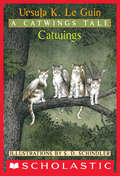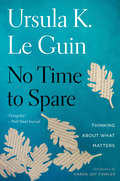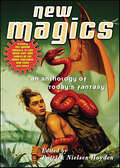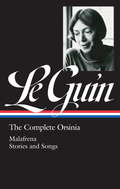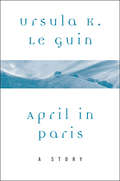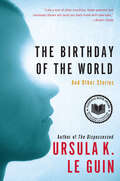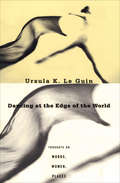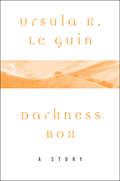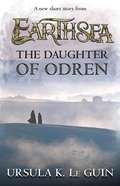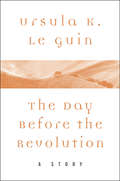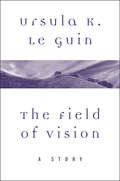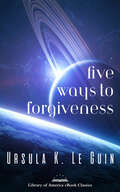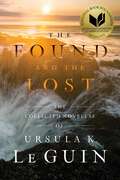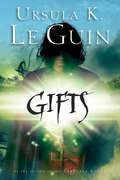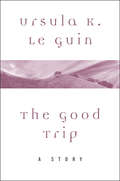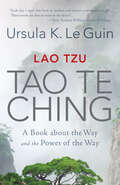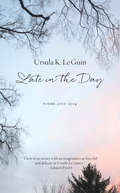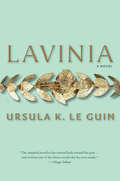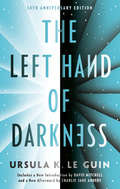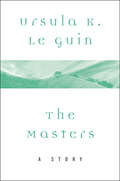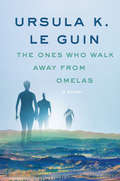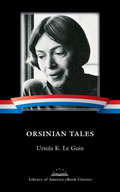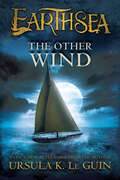- Table View
- List View
Catwings (Catwings #1)
by Ursula K. Le Guin Ken GeistThe bestselling Catwings series! <P><P>Mrs. Jane Tabby can't explain why her four precious kittens were born with wings, but she's grateful that they are able to use their flying skills to soar away from the dangerous city slums where they were born. However, once the kittens escape the big city, they learn that country life can be just as difficult!
No Time to Spare: Thinking About What Matters
by Ursula K. Le Guin Karen Joy FowlerUrsula K. Le Guin on the absurdity of denying your age: “If I’m ninety and believe I’m forty-five, I’m headed for a very bad time trying to get out of the bathtub.”On cultural perceptions of fantasy: “The direction of escape is toward freedom. So what is ‘escapism’ an accusation of?”On breakfast: “Eating an egg from the shell takes not only practice, but resolution, even courage, possibly willingness to commit crime.” Ursula K. Le Guin has taken readers to imaginary worlds for decades. Now she’s in the last great frontier of life, old age, and exploring new literary territory: the blog, a forum where her voice—sharp, witty, as compassionate as it is critical—shines. No Time to Spare collects the best of Ursula’s online writing, presenting perfectly crystallized dispatches on what matters to her now, her concerns with this world, and her unceasing wonder at it: “How rich we are in knowledge, and in all that lies around us yet to learn. Billionaires, all of us.”
New Magics: An Anthology of Today's Fantasy
by Ursula K. Le Guin Orson Scott Card Charles De LintWhether it's a tale of a wizard developing his powers or a breakneck chase through New York City in search of the Grail, the best fantasy is all about coming face to face with reality---with boundaries---and saying, What if? It's about stepping across the threshold of what is and what must be into a world of maybes and why-nots. Most of all, it's a great deal of fun.It's for today's generation of young readers that Patrick Nielsen Hayden---winner of the World Fantasy Award for Best Anthology---has selected these stories from the thousands published by contemporary fantasy writers over the past two decades. For those readers who keep asking questions but are never completely satisfied with the answers---only the journey.Here is National Book Award winner Ursula K. Le Guin with a tale of wizardry from the world of her Earthsea books. Here is Orson Scott Card, author of Ender's Game, with the original story of Prentice Alvin in alternate, magical nineteenth-century America. Here is Newbery Medal winner Robin McKinley with a tale of an exiled princess's quest to regain her people. Here is Sandman author Neil Gaiman with a story of chivalry, with a distinctly modern twist.Here are werewolves and princesses, battles and enchantments, and great stories from Jane Yolen, Harry Turtledove, Charles de Lint, Emma Bull, and more.Whimsical or harrowing, irreverent or sublime, each of these stories is an adventure in imagination. Journey from the here and now to New Magics.At the Publisher's request, this title is being sold without Digital Rights Management Software (DRM) applied.
Ursula K. Le Guin: Malafrena / Songs / Collected Stories
by Ursula K. Le Guin Brian AtteberyThe inaugural volume of Library of America's Ursula K. Le Guin edition gathers her complete Orsinian writings, enchanting, richly imagined historical fiction collected here for the first time. Written before Le Guin turned to science fiction, the novel Malafrena is a tale of love and duty set in the central european country of Orsinia in the early nineteenth century, when it is ruled by the Austrian empire. The stories originally published in Orsinian Tales (1976) offer brilliantly rendered episodes of personal drama set against a history that spans Orsinia's emergence as an independent kingdom in the twelfth century to its absorption by the eastern Bloc after World War II. The volume is rounded out by two additional stories that bring the history of Orsinia up to 1989, the poem "Folksong from the Montayna Province," Le Guin's first published work, and two never before published songs in the Orisinian language.From the Hardcover edition.
April in Paris: A Story
by Ursula K. Le GuinThe recipient of numerous literary prizes, including the National Book Award, the Kafka Award, and the Pushcart Prize, Ursula K. Le Guin is renowned for her spare, elegant prose, rich characterization, and diverse worlds. "April in Paris" is a short story originally published in the collection The Wind's Twelve Quarters.
The Birthday of the World
by Ursula K. Le GuinFor more than four decades, Ursula K. Le Guin has enthralled readers with her imagination, clarity, and moral vision. The recipient of numerous literary prizes, including the National Book Award, the Kafka Award, and five Hugo and five Nebula Awards, this renowned writer has, in each story and novel, created a provocative, ever-evolving universe filled with diverse worlds and rich characters reminiscent of our earthly selves. Now, in The Birthday of the World, this gifted artist returns to these worlds in eight brilliant short works, including a never-before-published novella, each of which probes the essence of humanity.Here are stories that explore complex social interactions and troublesome issues of gender and sex; that define and defy notions of personal relationships and of society itself; that examine loyalty, survival, and introversion; that bring to light the vicissitudes of slavery and the meaning of transformation, religion, and history. The first six tales in this spectacular volume are set in the author's signature world of the Ekumen, "my pseudo-coherent universe with holes in the elbows," as Le Guin describes it -- a world made familiar in her award-winning novel The Left Hand of Darkness. The seventh, title story was hailed by Publishers Weekly as "remarkable . . . a standout." The final offering in the collection, Paradises Lost, is a mesmerizing novella of space exploration and the pursuit of happiness.In her foreword, Ursula K. Le Guin writes, "to create difference-to establish strangeness-then to let the fiery arc of human emotion leap and close the gap: this acrobatics of the imagination fascinates and satisfies me as no other." In The Birthday of the World, this gifted literary acrobat exhibits a dazzling array of skills that will fascinate and satisfy us all.
Dancing at the Edge of the World: Thoughts on Words, Women, Places
by Ursula K. Le Guin"I have decided that the trouble with print is, it never changes its mind,” writes Ursula Le Guin in her introduction to Dancing at the Edge of the World. But she has, and here is the record of that change in the decade since the publication of her last nonfiction collection, The Language of the Night. And what a mind - strong, supple, disciplined, playful, ranging over the whole field of its concerns, from modern literature to menopause, from utopian thought to rodeos, with an eloquence, wit, and precision that makes for exhilarating reading.
Darkness Box: A Story
by Ursula K. Le GuinThe recipient of numerous literary prizes, including the National Book Award, the Kafka Award, and the Pushcart Prize, Ursula K. Le Guin is renowned for her spare, elegant prose, rich characterization, and diverse worlds. "Darkness Box" is a short story originally published in the collection The Wind's Twelve Quarters.
The Daughter of Odren
by Ursula K. Le GuinFor fourteen years, Weed, as she is called, the daughter of Lord Garnet, has brought offerings to the standing stone. Alone in a shallow valley, she implores the stone not to forget her. To remember who he is and the life he led. To wait until the day he will be avenged. Now the day has finally arrived. After fourteen long years of waiting, he will have his revenge and she will have her father back. Or will she? Master storyteller Ursula LeGuin takes readers back to Earthsea with this hauntingly beautiful tale of betrayal and revenge.
The Day Before the Revolution: A Story
by Ursula K. Le GuinThe recipient of numerous literary prizes, including the National Book Award, the Kafka Award, and the Pushcart Prize, Ursula K. Le Guin is renowned for her spare, elegant prose, rich characterization, and diverse worlds. "The Day Before the Revolution" is a short story originally published in the collection The Wind's Twelve Quarters.
The Field of Vision: A Story
by Ursula K. Le GuinThe recipient of numerous literary prizes, including the National Book Award, the Kafka Award, and the Pushcart Prize, Ursula K. Le Guin is renowned for her spare, elegant prose, rich characterization, and diverse worlds. "The Field of Vision" is a short story originally published in the collection The Wind's Twelve Quarters.
Five Ways to Forgiveness
by Ursula K. Le Guin<P>Here for the first time is the complete suite of five linked stories from Ursula K. Le Guin’s acclaimed Hainish series, which tells the history of the Ekumen, the galactic confederation of human colonies founded by the planet Hain. First published in 1995 as Four Ways to Forgiveness, and now joined by a fifth story, Five Ways to Forgiveness focuses on the twin planets Werel and Yeowe, two worlds whose peoples, long known as “owners” and “assets,” together face an uncertain future after civil war and revolution. <P>In “Betrayals” a retired science teacher must make peace with her new neighbor, a disgraced revolutionary leader. In “Forgiveness Day,” a female official from the Ekumen arrives to survey the situation on Werel and struggles against its rigidly patriarchal culture. Embedded within "A Man of the People,” which describes the coming of age of Havzhiva, an Ekumen ambassador to Yeowe, is Le Guin’s most sustained description of the Ur-planet Hain. "A Woman’s Liberation” is the remarkable narrative of Rakam, born an asset on Werel, who must twice escape from slavery to freedom. Joined to them is “Old Music and the Slave Women,” in which the charismatic Hainish embassy worker, who appears in two of the four original stories, returns for a tale of his own. Of this capstone tale Le Guin has written, “the character called Old Music began to tell me a fifth tale about the latter days of the civil war . . . I’m glad to see it joined to the others at last.”
The Found and the Lost: The Collected Novellas of Ursula K. Le Guin
by Ursula K. Le GuinEvery novella by Ursula K. Le Guin, an icon in American literature, collected for the first time--and introduced by the legendary author--in one breathtaking volume. <P><P>Ursula K. Le Guin has won multiple prizes and accolades from the Medal for Distinguished Contribution to American Letters to the Newbery Honor, the Nebula, Hugo, World Fantasy, and PEN/Malamud Awards. She has had her work collected over the years, but never as a complete retrospective of her longer works as represented in the wonderful The Found and the Lost. This collection is a literary treasure chest that belongs in every home library.
Gifts (Annals of the Western Shore #1)
by Ursula K. Le GuinScattered among poor, desolate farms, the clans of the Uplands possess gifts. Wondrous gifts: the ability--with a glance, a gesture, a word--to summon animals, bring forth fire, move the land. Fearsome gifts: They can twist a limb, chain a mind, inflict a wasting illness. The Uplanders live in constant fear that one family might unleash its gift against another. Two young people, friends since childhood, decide not to use their gifts. One, a girl, refuses to bring animals to their death in the hunt. The other, a boy, wears a blindfold lest his eyes and his anger kill.In this beautifully crafted story, Ursula K. Le Guin writes of the proud cruelty of power, of how hard it is to grow up, and of how much harder still it is to find, in the world's darkness, gifts of light.Includes a reader's guide and a sample chapter from the companion title Voices.
The Good Trip: A Story
by Ursula K. Le GuinThe recipient of numerous literary prizes, including the National Book Award, the Kafka Award, and the Pushcart Prize, Ursula K. Le Guin is renowned for her spare, elegant prose, rich characterization, and diverse worlds. "The Good Trip" is a short story originally published in the collection The Wind's Twelve Quarters.
Lao Tzu: Tao Te Ching
by Ursula K. Le GuinNo other English translation of this greatest of the Chinese classics can match Ursula Le Guin's striking new version. Le Guin, best known for thought-provoking science fiction novels that have helped to transform the genre, has studied the Tao Te Ching for more than forty years. She has consulted the literal translations and worked with Chinese scholars to develop a version that lets the ancient text speak in a fresh way to modern people, while remaining faithful to the poetic beauty of the work. Avoiding scholarly interpretations and esoteric Taoist insights, she has revealed the Tao Te Ching's immediate relevance and power, its depth and refreshing humor, in a way that shows better than ever before why it has been so much loved for more than 2,500 years. Included are Le Guin's own personal commentary and notes on the text. This new version is sure to be welcomed by the many readers of the Tao Te Ching as well as those coming to the text for the first time.
Late in the Day: Poems 2010–2014
by Ursula K. Le Guin"There is no writer with an imagination as forceful and delicate as Ursula K. Le Guin's." —Grace Paley Late in the Day, Ursula K. Le Guin's new collection of poems (2010–2014) seeks meaning in an ever-connected world. In part evocative of Neruda's Odes to Common Things and Mary Oliver's poetic guides to the natural world, Le Guin's latest give voice to objects that may not speak a human language but communicate with us nevertheless through and about the seasonal rhythms of the earth, the minute and the vast, the ordinary and the mythological. As Le Guin herself states, "science explicates, poetry implicates." Accordingly, this immersive, tender collection implicates us (in the best sense) in a subjectivity of everyday objects and occurrences. Deceptively simple in form, the poems stand as an invitation both to dive deep and to step outside of ourselves and our common narratives. The poems are bookended with two short essays, "Deep in Admiration" and "Some Thoughts on Form, Free Form, Free Verse."
Lavinia
by Ursula K. Le GuinIn a richly imagined, beautiful new novel, an acclaimed writer gives an epic heroine her voice. In The Aeneid, Virgil’s hero fights to claim the king’s daughter, Lavinia, with whom he is destined to found an empire. Lavinia herself never speaks a word. Now, Ursula K. Le Guin gives Lavinia a voice in a novel that takes us to the half-wild world of ancient Italy, when Rome was a muddy village near seven hills. Lavinia grows up knowing nothing but peace and freedom, until suitors come. Her mother wants her to marry handsome, ambitious Turnus. But omens and prophecies spoken by the sacred springs say she must marry a foreigner-that she will be the cause of a bitter war-and that her husband will not live long. When a fleet of Trojan ships sails up the Tiber, Lavinia decides to take her destiny into her own hands. And so she tells us what Virgil did not: the story of her life, and of the love of her life. Lavinia is a book of passion and war, generous and austerely beautiful, from a writer working at the height of her powers.
The Left Hand of Darkness: 50th Anniversary Edition (Penguin Galaxy Ser.)
by Ursula K. Le GuinWinner of the Hugo and Nebula AwardsA groundbreaking work of science fiction, The Left Hand of Darkness tells the story of a lone human emissary to Winter, an alien world whose inhabitants can change their gender. His goal is to facilitate Winter's inclusion in a growing intergalactic civilization. But to do so he must bridge the gulf between his own views and those of the completely dissimilar culture that he encounters. Embracing the aspects of psychology, society, and human emotion on an alien world, The Left Hand of Darkness stands as a landmark achievement in the annals of intellectual science fiction.
Malafrena
by Ursula K. Le Guinin a career spanning half a century, Ursula K. Le Guin has produced a body of work that testifies to her abiding faith in the power and art of words. She is perhaps best known for imagining future intergalactic worlds in brilliant books that challenge our ideas of what is natural and inevitable in human relations--and that celebrate courage, endurance, risk-taking, and above all, freedom in the face of the psychological and social forces that lead to authoritarianism and fanaticism. it is less well known that she first developed these themes in richly imagined historical fiction, including the brilliant early novel Malafrena.An epic meditation on the meaning of hope and freedom, love and duty, Malafrena takes place from 1825 to 1830 in the imaginary East European country of Orsinia, then a part of the Austrian Empire, a nation which, like its near neighbors Czechoslovakia, Poland, and Romania, has a long and vivid history of oppression, art, and revolution. itale Sorde, the idealistic heir to Val Malafrena, an estate in the rural western provinces of Orsinia, leaves home against his father's wishes to work as a journalist in the cosmopolitan capital city of Krasnoy, where he plays an integral part in the revolutionary politics that are roiling Europe.Complete with a newly researched chronology of Le Guin's life and career.
The Masters: A Story
by Ursula K. Le GuinThe recipient of numerous literary prizes, including the National Book Award, the Kafka Award, and the Pushcart Prize, Ursula K. Le Guin is renowned for her spare, elegant prose, rich characterization, and diverse worlds. "The Masters" is a short story originally published in the collection The Wind's Twelve Quarters.
Nine Lives: A Story
by Ursula K. Le GuinThe recipient of numerous literary prizes, including the National Book Award, the Kafka Award, and the Pushcart Prize, Ursula K. Le Guin is renowned for her spare, elegant prose, rich characterization, and diverse worlds. "Nine Lives" is a short story originally published in the collection The Wind's Twelve Quarters.
The Ones Who Walk Away from Omelas: A Story
by Ursula K. Le GuinThe recipient of numerous literary prizes, including the National Book Award, the Kafka Award, and the Pushcart Prize, Ursula K. Le Guin is renowned for her spare, elegant prose, rich characterization, and diverse worlds. "The Ones Who Walk Away from Omelas" is a short story originally published in the collection The Wind's Twelve Quarters.
Orsinian Tales
by Ursula K. Le Guinin a career spanning half a century, Ursula K. Le Guin has produced a body of work that testifies to her abiding faith in the power and art of words. She is perhaps best known for imagining future intergalactic worlds in brilliant books that challenge our ideas of what is natural and inevitable in human relations--and that celebrate courage, endurance, risk-taking, and above all, freedom in the face of the psychological and social forces that lead to authoritarianism and fanaticism. it is less well known that she first developed these themes in richly imagined historical fiction set in the imaginary East European country of Orsinia, including the enchanting stories collected in Orsinian Tales. These brilliantly rendered stories recount episodes of personal drama set against a history that spans Orsinia's emergence as an independent kingdom in the twelfth century to its absorption by the eastern Bloc after World War ii. Here is a dimension of Le Guin's extraordinary literary imagination that will surprise and delight readers.Complete with a newly researched chronology of the author's life and career.
The Other Wind (Earthsea Ser. #Vol. 5)
by Ursula K. Le GuinThe sorcerer Alder fears sleep. He dreams of the land of death, of his wife who died young and longs to return to him so much that she kissed him across the low stone wall that separates our world from the Dry Land-where the grass is withered, the stars never move, and lovers pass without knowing each other. The dead are pulling Alder to them at night. <P><P>Through him they may free themselves and invade Earthsea. <P>Alder seeks advice from Ged, once Archmage. Ged tells him to go to Tenar, Tehanu, and the young king at Havnor. They are joined by amber-eyed Irian, a fierce dragon able to assume the shape of a woman. <P>The threat can be confronted only in the Immanent Grove on Roke, the holiest place in the world and there the king, hero, sage, wizard, and dragon make a last stand. <P>Le Guin combines her magical fantasy with a profoundly human, earthly, humble touch.
